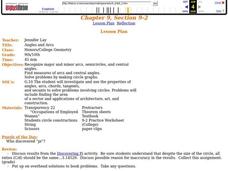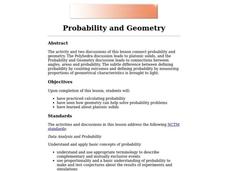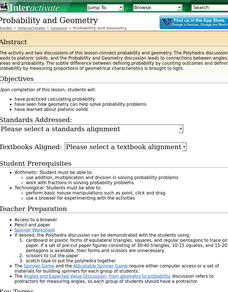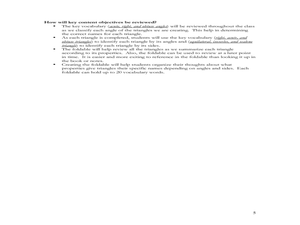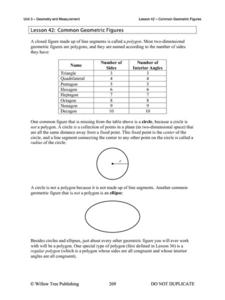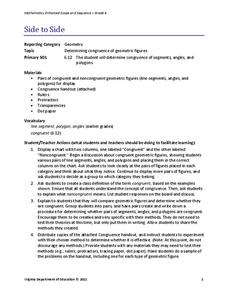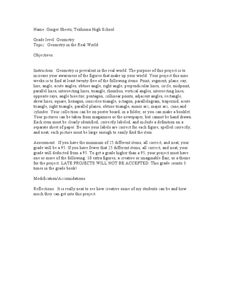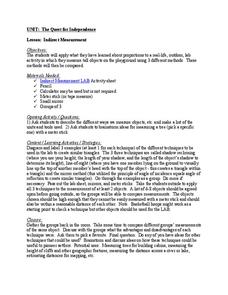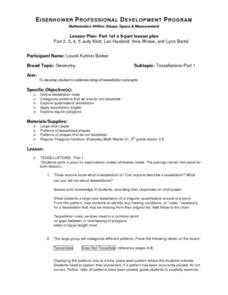Curated OER
Angles and Arcs
Learners discuss the sum of central angles and use string to create them on circles. They find the measure and length of both minor and major arcs.
Students give examples of concentric, similar, and congruent circles and congruent arcs.
Ohio Department of Education
I Can Name that Angle in One Measure! - Grade Eight
Collaborative groups work with geometry manipulatives to investigate conjectures about angles. They create a graphic organizer to use in summarizing relationships among angles in intersecting, perpendicular and parallel lines cut by a...
Curated OER
Gravity, Angles, and Measurement
Students relate math to real life scenarios. In this geometry lesson, students launch a ball tracking each launch using a graph. They analyze their data for speed, angles and distance, trying to improve on each launch.
Curated OER
Probability and Geometry
Students explore the ways Geometry can help solve probability problems. Students describe platonic solids and practice calculating probability using an online resource. They construct dice with various numbers of sides to demonstrate...
Curated OER
Probability and Geometry
Students practice calculating probability, see how geometry can help solve probability problems and explore platonic solids.
Curated OER
Angles in Triangles
Eighth graders translate word problems using mathematical ideas. In this geometry lesson, 8th graders identify angles of triangles using equations and the triangle sum theorem. They create angles with a protractor and straight edge.
Curated OER
Inscribed Angles
Pupils analyze inscribed angles and intercepted arcs and explore the relationships between the two. They investigate the properties of angles, arcs, chords, tangents, and secants to solve problems involving circles.
EngageNY
The Angle-Angle (AA) Criterion for Two Triangles to Be Similar
What do you need to prove triangles are similar? Learners answer this question through a construction exploration. Once they establish the criteria, they use the congruence and proportionality properties of similar objects to find...
EngageNY
Using Trigonometry to Find Side Lengths of an Acute Triangle
Not all triangles are right! Pupils learn to tackle non-right triangles using the Law of Sines and Law of Cosines. After using the two laws, they then apply them to word problems.
EngageNY
The Side-Angle-Side (SAS) and Side-Side-Side (SSS) Criteria for Two Triangles to Be Similar
Playing with mathematics can invoke curiosity and excitement. As pupils construct triangles with given criteria, they determine the necessary requirements to support similarity. After determining the criteria, they practice...
Willow Tree
Common Geometric Figures
Geometry could be called the study of figures. An overview of the figures found in a typical geometry course contains a study of different triangles, quadrilaterals, and regular polygons.
Alabama Learning Exchange
What You Know About the Bermuda Triangle?
Get lost in the classifications. Using the backdrop of the Bermuda Triangle, pupils classify it by angle and side measures. They also learn information about the triangle and its history.
Virginia Department of Education
Constructions
Pupils learn the steps for basic constructions using a straightedge, a compass, and a pencil. Pairs develop the skills to copy a segment and an angle, bisect a segment and an angle, and construct parallel and perpendicular lines.
Virginia Department of Education
Side to Side
Congruent figures: two figures that want to be just like each other. Individuals learn to distinguish between figures that are congruent and those that are not. Measuring the lengths of line segments and angles helps in this endeavor.
University of Nottingham
Drawing to Scale: A Garden
See how design and geometry go hand in hand. The activity asks learners to use geometry to design a backyard garden given dimensions of each feature. Scholars work with ratios and scale to develop an accurate scale drawing that includes...
EngageNY
Fundamental Theorem of Similarity (FTS)
How do dilated line segments relate? Lead the class in an activity to determine the relationship between line segments and their dilated images. In the fourth section in a unit of 16, pupils discover the dilated line...
Curated OER
Geometry in the Real World
Eighth graders complete a unit of lessons on basic geometry concepts. They participate in a variety of activities, culminating in a project that involves publishing a booklet or a poster that presents the major geometry concepts from the...
Curated OER
Indirect Measurement
Learners measure and apply their knowledge of proportion to solve problems. In this geometry lesson, students measure using a meter stick, small mirror and measuring tape. They compare and contrast their measurements to objects outside...
Curated OER
Angles: Angles, Angles, Everywhere
Students estimate and accurately measure the size of angles communicate with the appropriate geometric terms and symbols to describe and name angles, lines, line segments, rays
Curated OER
Angle Benchmarks
Sixth graders discuss the characteristics of specific angles and then use the information to to identify and estimate given angles. The class goes outside, identifies north, and turns a specified amount of degrees. Using a given compass,...
Curated OER
Geometry in Tessellations
Students examine tessellations and their geometric properties. Students also develop a better understanding of lines, planes, angles, and polygons.
Curated OER
Geometry Slideshow
Sixth graders create slideshows of geometric terms. They use images taken with digital cameras or scanned from magazines.
Curated OER
Angle Pairs
Students practice identifying right, vertical, and adjacent angles using a Smartboard. They then determine measurements of all of the angles when only one measurement is given.
Curated OER
Geometry /Tessellations
Learners investigate the concept of tessellations and how they are formed using angles. They categorize how different patterns do and not tessellate and separate them into two different places for assessment. The teacher draws examples...
